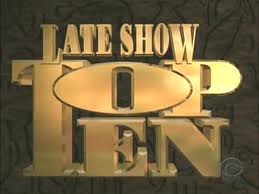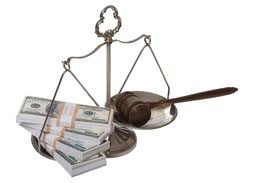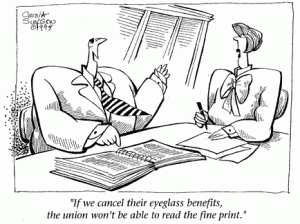Patty Ewing Robichaud, March 15, 2011
 Top 10 ways to tell if you might be a member of a public-sector union
Top 10 ways to tell if you might be a member of a public-sector union
By David Letterman
10.) You take a week off to protest in Wisconsin and your office runs better.
9.) On a snow day when they say “non-essential” people should stay home you know who they mean.
8.) You get paid twice as much as a private sector person doing the same job but make up the difference by doing half as much work.
7.) It takes longer to fire you than the average killer spends on death row.
6.) The worse you do your job, the more your boss avoids you.
5.) You think the French are working themselves to death.
4.) You know by having a copy of the Holy Koran on your desk your job is 100% safe.
3.) You spend more time at protest marches than at church.
2.) You have a Democratic congressman’s lips permanently attached to your butt.
1.) You pay more in union dues than you do for your healthcare insurance.A
As comical as the Top 10 list is, taxpayer funds used to pay for these privileges are more than just simple wages and benefits.
Legal Fees Associated with Dealing with Unions
Did you know that cities, counties, and school districts often hire outside public labor law firms when it comes to:
- Union negotiations/collective bargaining
- Terminating a union member – regardless of the offense – which often results in costly court trials.
- Changing employee classifications, benefits, and other employer-required changes
- Training management/holding workshops on how to interact with union employees to avoid litigation
How do I know this? From my personal experience working as a legal secretary in a law firm specializing in Public Labor Law. These specialists did not choose this practice out of love – it is a business of big bucks, high paid attorneys, clerks, and legal secretaries.
For instance, the firm I worked for was hired to remove a teacher – I believe she taught 4th grade – and she had clearly gone round the bend. She made all of the children remove any Christian or Jewish jewelry, told them they were all going to hell, and tried to teach them some kind of a voodoo religion. The kids were traumatized, many parents refused to let their children go back to that classroom, and the union would not allow the teacher to be removed without exhausting all of the legal remedies in place to protect union employees. The school district was finally allowed to put the teacher on administrative leave with Full Pay and Benefits during the year or more it took to remove the teacher. There were hundreds of hours involved in the hearing with the school board, the union fighting the finding and demanding their day in court; the legal process of discovery (requesting records by both sides), many depositions – which require a court reporter, attorneys from both sides, the defendant, and administrators, and of course, the actual time in court, which required more than one day with administrators, attorneys, union officials, and witnesses.
If you have ever been involved with any legal preceding, you KNOW how expensive all of this must be. And that’s just on the administrative side.
And guess who ultimately pays all of these costs in the way of taxes? You and I pay in a variety of ways through taxation and bonds.
For additional information, read The Cost of Union Laws by Roman Hardgrave and Public Sector Unions’ Heavy Burden on Taxpayers by Ivan Osorio.
So What About the Unions?
In fact, not only does the taxpayer get to foot this bill, but we are technically also paying for the union’s lawyers, representatives, executives, lobbyists, and campaign contributions to politicians – as well as any billboard/commercial/print ad stating the union point of view on legislature, candidates, and a myriad of other topics.
 What? You thought Jimmy Hoffa and other union bosses do the job for love?
What? You thought Jimmy Hoffa and other union bosses do the job for love?
Look at some of these employment opportunities (and pay) for jobs within one public-sector union:
AFSCME Employment Opportunities
Yes, these wages are paid through union dues. Public-sector union members have their union dues taken directly out of their taxpayer-funded pay by the city/county/district (an additional expense) to be paid directly to the union.
These union employees must work in a building and have benefits, too. Get the drift??
And in the case of Wisconsin, the union HIRED professional picketers who were paid.
Me? I am tired of paying these unions, their hired thugs, and their benefits. I would rather have a little more disposable income to invest as I see fit – perhaps even being able to donate to educational programs that I support.




